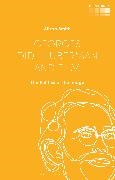Mehr lesen
Georges Didi-Huberman is a philosopher of images whose work is overdue for attention from English-language readers. Since the publication of his first book in 1982, he has published 46 essays, mostly with the prestigious Editions de Minuit, on topics ranging from monographs on individual artists to critical excursions into political philosophy. He is recognised in France and elsewhere in Europe as one of the foremost philosophers of the image writing today.
In
Georges Didi-Huberman and Film, Alison Smith concentrates on how Didi-Huberman's work has been informed by cinema, especially in his major (and ongoing) recent work
L'Oeil de l'Histoire (The Eye of History). The book traces the development of Didi-Huberman's visual thought towards a cinematic sensibility already inherent in his early work on images in relationship to each other. After exploring his increasingly political understanding of the vital role of cinematic montage, it traces his growing understanding of cinema as a medium for expressing a dynamic representation of peoples' memory and experience, and documents his engagement with contemporary filmmakers such as Laura Waddington and Vincent Dieutre.
Inhaltsverzeichnis
Introduction: Bio-bibliographical summary, development of thought
1. Images of the catastrophe
2. History and the montage aesthetic
3. The past in the present, survivances
4. Revealing a ‘people’: a political project
5. Didi-Huberman on screen
Conclusion
Bibliography
Über den Autor / die Autorin
Alison Smith is Lecturer of Film Studies in the School of Histories, Languages and Cultures at the University of Liverpool, UK. She has a special interest in French cinema and the film-related thought of Georges Didi-Huberman.
Zusammenfassung
Georges Didi-Huberman is a philosopher of images whose work is overdue for attention from English-language readers. Since the publication of his first book in 1982, he has published 46 essays, mostly with the prestigious Editions de Minuit, on topics ranging from monographs on individual artists to critical excursions into political philosophy. He is recognised in France and elsewhere in Europe as one of the foremost philosophers of the image writing today.
In Georges Didi-Huberman and Film, Alison Smith concentrates on how Didi-Huberman’s work has been informed by cinema, especially in his major (and ongoing) recent work L’Oeil de l’Histoire (The Eye of History). The book traces the development of Didi-Huberman’s visual thought towards a cinematic sensibility already inherent in his early work on images in relationship to each other. After exploring his increasingly political understanding of the vital role of cinematic montage, it traces his growing understanding of cinema as a medium for expressing a dynamic representation of peoples’ memory and experience, and documents his engagement with contemporary filmmakers such as Laura Waddington and Vincent Dieutre.
Vorwort
Focuses on Didi-Huberman's work about a political philosophy of image practice, spanning production, reception, and the organisation of reception (for example, through curation).

